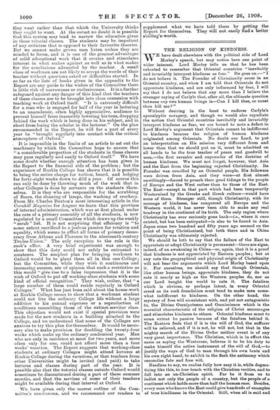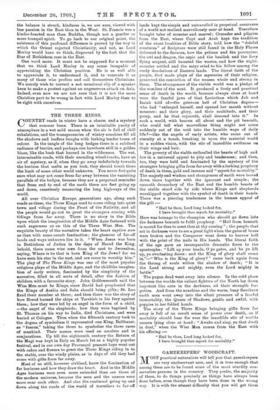THE RELIGION OF KINDNESS.
WE have dealt elsewhere with the political side of Lord Morley's speech, but may notice here one point of wider interest. Lord Morley tells us that he has been exhorted to remember that Oriental countries "inevitably and invariably interpret kindness as fear." He goes on :—" I do not believe it. The Founder of Christianity arose in an Oriental country, and when I am told that Orientals do not appreciate kindness, and are only influenced by fear, I will say that I do not believe that any more than I believe the stranger saying of Carlyle that, after all, the ultimate question between any two human beings is—Can I kill thee, or canst thou kill me ? "
Without desiring in the least to endorse Carlyle's apocalyptic savagely, and though we would also repudiate the notion that Oriental countries inevitably and invariably interpret kindness as fear, we are bound to note a defect in Lord Morley's argument that Orientals cannot be indifferent to kindness because the religion of human kindness originated among Orientals. No doubt our Lord, to put an interpretation on His mission very different from and lower than that we should put on it, must be admitted on all hands to be the true teacher of peace and goodwill to men,—the first revealer and expounder of the doctrine of human kindness. We must not forget, however, that Asia and the East from the beginning rejected Christianity. Ite Founder was crucified by an oriental people, His followers were driven from Asia, and they were—at first almost unwillingly—forced to preach their good tidings to the people of Europe and the West rather than to those of the East. The East—except in that part which had been temporarily Westernised by the Greeks and Greek culture—would have none of them. Stranger still, though Christianity, with its message of kindness, has conquered all Europe and the Western world, it has never been able to make any real headway in the continent of its birth. The only region where Christianity has ever seriously gone back—i.e., where it once existed, but has been extirpated—is also to be found in Asia. Japan some two hundred and fifty years ago seemed on the point of being Christianised, but both there and in China Christianity was ultimately rejected.
We should be loth to say that the failure of the East to appreciate or adopt Christianity is permanent—there are signs, indeed, of an awakening in China—or, again, that it is a proof that kindness is not appreciated by Eastern peoples ; but at any rate the geographical and physical origin of Christianity will not bear the arguments which Lord Morley based upon it. , For ourselves, we should say that though Orientals, like other human beings, appreciate kindness, they do not rate it nearly as high as the Western peoples do, nor as our Lord taught the world to rate it. The fatalism which is obvious, or perhaps latent, in every Oriental creed as its rock foundation must tend to make men some- what indifferent to kindness. On the other hand, the mystery of free will co-existent with, and yet not antagonistic to, the Divine Omnipotence and Omniscience which is the essential characteristic of the religion of Christ encourages and stimulates kindness to others. Oriental kindness must to some extent be passive because of the fatalism behind it. The Eastern feels that if it is the will of God, the sufferer will be relieved, and if it is not, he will not, but that in the mighty march of the Divine Order neither event is of any very great importance. The Christian, which is in effect the same as saying the Westerner, believes it to be his duty to make himself the active instrument of the will of God,—to justify the ways of God to man through his own brain and his own right hand, to exhibit in the flesh the antinomy which reconciles fate and free will.
Needless to say, we realise fully how easy it is, while dogma- tising like this, to lose touch with the Christian verities, and to fall into an un-Christian spirit. Far be it from us to indict not only the people of a country, but the people of a continent which holds more than half the human race. Besides, every man who knows the East could give hundreds of examples of true kindliness in the Oriental Still, when all is said and
the balance is struck, kindness is, we are sure, viewed with less passion in the East than in the West. St. Francis was a kinder-hearted man than Buddha, though not a gentler or more tranquil spirit. To go back to our original point, the existence of this profound difference is proved by the way in which the Orient rejected Christianity, and not, as Lord Morley would have us think, disproved by the fact that the Star of Bethlehem rose in the East.
One word more. It must not be supposed for a moment that we think Lord Morley in any sense incapable of 'appreciating the Christian position. He is as well able to appreciate it, to understand it, and to venerate it as many of those who profess and call themselves Christians. We merely wish to correct a not unnatural slip of a speaker keen to make a protest against an ungenerous attack on Asia. Indeed, even now we are not sure that it is not the more Christian part to be wrong in fact with Lord Morley than to he right with ourselves.







































 Previous page
Previous page